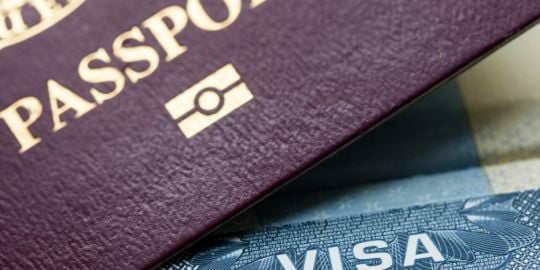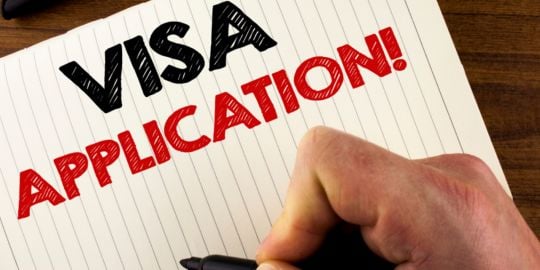Bonjour à tous,
Je suis à la recherche d'une information que je n'ai réussi à trouver nulle part.
Si des experts de l'administration sont dans le coin je compte sur vous.
Je vais m'installer en Thaïlande avant la fin de l'année, plus précisément à Bangkok.
Mon objectif est de trouver un emploi. Je sais déjà dans quel domaine et quels sont mes chances d'en trouver un.
J'envisage d'entrer dans le pays avec un visa ED ce qui me permettra de rester jusqu'à un an dans le pays tout en apprenant la langue.
Durant cette période je serai quand même en recherche d'emploi. Il y a des donc des chances que je trouve un poste durant la période de mon visa ED.
Ma question est la suivante : peut-on , en cours d'année, passer d'un visa ED à un work permit ? Ou y a-t-il des restrictions ?
Merci pour les réponses que vous pourrez m'apporter.
VIsa ED et Work Permit
je pense que tu ne peux pas passer d'un visa ED à un visa non immigrant B qui est celui auquel un work permit donne droit .A confirmer par un avocat ou les services de l'immigration bien sûr .
Salut Poulardos je te donne mon avis de néophyte mais qui me semble correct.
Si une entreprise te fait part de son intention de t'embaucher alors tu sors du pays afin d'obtenir ton visa non imigrant dans une ambassde thai d'un pays lambda, muni de ta lettre de recommandation de ladite companie.
Ensuite ton entreprise s'occuperas de ton work permit.
tout celà se discuteras en amont avec ton boss.
Salut Poulardos,
Je suis exactement dans le même cas que toi, mon départ définitif pour la Thaïlande étant pour Septembre/Octobre 2013.
Je vais arrivé avec un visa ED, le temps d'apprendre le thai et de développé mon projet.
Pour obtenir le work permit par la suite, comme expliqué plus haut il nous faut le visa Non-Immigrant B.
En étant sur le territoire thaï, il faut aller à l'ambassade de Thaïlande la plus proche pour en faire la demande.
Voici la liste :
• Cambodge (Phnom Penh)
• Laos (Vientiane)
• Myanmar (Yangon)
tu as l air bien sur de trouver du boulot , en tout cas c est bien mieux vaut partir dans cette optique .
pour ta premiére année tu peux également enchainer 2 visa touristiques de suite ( si c est toujours valable ... à condition de ne pas déja avoir un visa thai sur ton passport ), ce qui te laisse une année pour chercher du boulot .
sinon dans le cas de figure , venir avec un visa étudiant et passer en non imm B ne devrait poser aucun probléme dans la mesure ou ton entreprise t'embauche avec un work permit .
pour le visa ed tu sors de thailande sans reentry permit et ton visa ed est automatiquement annuler .
Alex-KPN a écrit:Salut Poulardos,
Je suis exactement dans le même cas que toi, mon départ définitif pour la Thaïlande étant pour Septembre/Octobre 2013.
Je vais arrivé avec un visa ED, le temps d'apprendre le thai et de développé mon projet.
Pour obtenir le work permit par la suite, comme expliqué plus haut il nous faut le visa Non-Immigrant B.
En étant sur le territoire thaï, il faut aller à l'ambassade de Thaïlande la plus proche pour en faire la demande.
Voici la liste :
• Cambodge (Phnom Penh)
• Laos (Vientiane)
• Myanmar (Yangon)
• Malaisie (Kuala Lampur, Penang)
L'Ambassade Royale de Thaïlande de Kuala Lumpur, une destination prisé pour le visa run par les expatriés de Phuket, a confirmé au journal Gazette de Phuket qu'elle ne délivre plus de visas de non-immigrant B de 12 mois
Merci Silom pour la précision je viens de modifier 
On peut changer un visa ED pour un autre visa mais c'est complexe et tu as besoin de 21 jours disponible sur ton visa avant de faire le changement. N'applique jamais à la dernière minute car il y a souvent des documents manquants et ils changent les règles très souvent.
Il est mieux d'arriver avec un visa non-immigrant si tu le peux.
Il y a diverses catégories de non-immigrant mais la plupart des consulats ou ambassades Thai n'inscrivent que non-immigrant sauf pour les cas de retraites.
Il est facile d'obtenir un visa d'un an avec une lettre d'invitation d'un cabinet d'avocats ou d'une compagnie Thai dans les consulats d'Anvers (Belgique), Hull (UK), Brisbane (Australie) Alabama (USA) mais plusieurs autres endroits ne donnent que 3 mois. Il n'y a pas de raison spécifique, c'est comme cela. Chaque endroit à ses règles.
N'appliques pas dans une grande ambassade, comme Paris, Londres, etc. Tu appliques dans un petit consulat car c'est plus facile. Ils veulent faire de l'argent, restez en vie et donnent de meilleurs services. Les grosses ambassades savent qu'elles ne disparaîtront pas.
J'ai été manager pour Siam-Legal et nous faisions beaucoup de visas à l'époque mais je ne fais presque plus de visa maintenant.
C'est vraiment complexe et il faut vérifier les dernières règles et directives.
Quand aux extensions en Thaïlande, une fois ici, c'est toujours les règles du Police Order 777/2551 qui s'appliquent.
Oui on peux sans soucis changer de visa en cours de route. Si vous souhaitez obtenir un visa non b + work permit c'est seulement dans le cas ou vous serez embauché par une entreprise thai. Sachez que depuis un an les règles se sont durcies a cause de nombreux abus. Le visa Ed ne vous donne pas de droit de travailler , il est valable 1 an a condition de ne pas sortir de Thaïlande et de justifier tous les 90 jours de votre résidence.De plus il ne permet pas les sorties du pays sauf si vous y ajouter un re entry visa qui peut être single ou multiple. Le visa non b n'est plus délivré dans de nombreux pays. Laissez donc faire votre entreprise pour les démarches administratives.
Non-Immigrant Visa “B” - (business and work)
1. Visa Issuance
1.1 Foreigners who wish to work, conduct business or undertake investment activities in Thailand must apply for a Non-Immigrant Visa at the Royal Thai Embassies or Royal Thai Consulates-General. Various categories of the Non-Immigrant Visa are currently provided to meet the needs and qualifications of individual business persons. These include business visa Category “B”, business-approved visa Category “B-A” and investment and business visa Category “IB”. Holder of this type of visa wishing to work in Thailand must be granted a work permit before starting work. The visa fee is 2,000 Baht for single-entry with three-month validity and 5,000 Baht for multiple entries with one-year validity.
1.2 Nationals of certain countries are required to apply for a visa only at the Royal Thai Embassy or Royal Thai Consulate-General in their home/residence country or at the designated Royal Thai Embassy or Royal Thai Consulate-General. Travellers are advised to contact the nearest Royal Thai Embassy or Consulate-General to find out where they may apply for a visa to Thailand before departure. For more information on contact details and locations of the Royal Thai Embassies and Royal Thai Consulates-General, see www.mfa.go.th/web/10.php
2. Application for Visa
2.1 Non-Immigrant Visa Category “B” (Business Visa) is issued to applicants who wish to enter the Kingdom to work or to conduct business.
(1) Foreigners who wish to work in Thailand must provide the following documents:
- Passport or travel document with validity of not less than 6 months.
- Completed visa application form.
- Recent passport-sized photograph (4 x 6 cm) of the applicant taken within the past 6 months.
- Evidence of adequate finance (20,000 Baht per person and 40,000 Baht per family).
- Letter of approval from the Ministry of Labour. To obtain this letter, the applicant's prospective employer in Thailand is required to submit Form WP3 at the Office of Foreign Workers Administration, Department of Employment, Ministry of Labour Tel. 02-2452745, or at the Provincial Employment Office in his or her respective province. More information is available at www.doe.go.th/workpermit/index.html
- Copy of Work Permit issued by the Ministry of Labour and alien income tax or Por Ngor Dor 91 (only in the case where applicant has previously worked in Thailand).
- Corporate documents of hiring company in Thailand such as:
1) business registration and business license
2) list of shareholders
3) company profile
4) details of business operation
5) list of foreign workers stating names, nationalities and positions
6) map indicating location of the company
7) balance sheet, statement of Income Tax and Business Tax (Por Ngor Dor 50 and Por Ngor Dor 30 of the latest year)
8) value-added tax registration (Por Por 20)
- Document indicating the number of foreign tourists (for tourism business only), or document indicating export transactions issued by banks (for export business only).
N.B.
- An alien who receives a Non-Immigrant visa can work in Thailand once he or she is being granted a work permit. An alien in violation of the Immigration Act B.E. 2522 (1979) concerning taking up employment without work permit or the Royal Decree B.E. 2522 (1979) concerning holding employment in certain restricted occupations and professions shall be prosecuted and imprisoned or fined, or shall face both penalties.
- It is recommended that the applicant should apply for visa at the Thai Embassy/ Consulate in the country where he/she has the residence
(2) Foreigners who wish to conduct business in Thailand must provide the following documents:
- Passport or travel document with a validity of not less than 6 months.
- Completed application form.
- Recent passport-sized photograph (4 x 6 cm) photograph of the applicant taken within the past 6 months.
- Evidence of adequate finance (20,000 Baht per person and 40,000 Baht per family) for the duration of stay in Thailand
- Letter from the applicant's company indicating the applicant's position, length of employment, salary and purpose of visit(s) to Thailand.
- Documents showing correspondence with business partners in Thailand.
- Evidence of financial status in the case where the applicant is self-employed.
- Letter of invitation from trading or associated partners/companies in Thailand.
- Corporate documents of associated partners/companies in Thailand such as:
1) business registration and business license
2) list of shareholders
3) company profile
4) details of business operation
5) map indicating location of the company
6) balance sheet, statement of Income Tax and Business Tax (Por
Ngor Dor 50 and Por Ngor Dor 30) of the latest year
7) value-added tax registration (Por Por 20)
(3) Copies of company documents must be signed by the Board of Directors or authorised managing director and affix seal of company.
(4) Additional documents may be requested as and when necessary. In the absence of a required document, applicant must provide a letter explaining the unavailability of such document. Applicant must endorse on each and every page of the submitted copies of documentation. Documents in foreign languages must be translated into Thai and should be notorised by notary organs or by the applicant's diplomatic or consular mission.
(5) Holder of this type of visa is entitled to stay in Thailand for a maximum period of 90 days. He or she may apply for an extension of stay at the Office of the Immigration Bureau and may be granted such extension for a period of one year from the date of first entry into Thailand.
2.2 Non-Immigrant Visa category “B-A” (Business Approved Visa) The granting of such visa to qualified applicants is under the jurisdiction of the Office of the Immigration Bureau in Bangkok. The applicant's associated company in which he or she will invest in or conduct business with may apply for this type of visa on behalf of the applicant at the Office of the Immigration Bureau. Once the application is approved, the Immigration Bureau will advise the concerned Royal Thai Embassy or Royal Consulate-General via the Ministry of Foreign Affairs to issue the visa to the applicant. The holder of this category “B-A” visa will be permitted to stay for a period of one year from the date of first entry into the Kingdom.
2.3 Non-Immigrant Visa Category “IB” (Investment and Business Visa) is issued to foreign citizens employed to work on investment projects which are under the auspices of the Board of Investment of Thailand (BOI). Such projects must be involved in or bring benefit to Thailand in the following ways:
- Export-promotion
- Increasing employment
- Utilising local raw materials
- Projects engaging the provinces
- Encouraging technology transfer to Thai nationals
- Not hindering existing domestic businesses
Bon courrage
Merci a tous pour vos réponses.
Je suis mieux calé sur le sujet maintenant.









